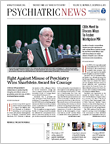An Institute of Medicine (IOM) report on psychosocial interventions for mental illness and substance abuse is drawing praise, recommendations for improvement, and some sharp criticism from psychiatrists and mental health professionals who are experts on psychotherapy and other psychosocial treatments.
In the November issue of the journal Depression and Anxiety, Myrna Weissman, Ph.D., a member of the IOM committee that wrote the report released earlier this year, provided an overview and the committee’s findings, followed by seven commentaries by clinicians in various fields of psychosocial research and treatment. The report, “Psychosocial Interventions for Mental and Substance Use Disorders: A Framework for Establishing Evidence-Based Standards,” acknowledged that a disparate body of research has established the effectiveness of a great variety of interventions—psychotherapies, peer-to-peer support strategies, supported employment, assertive community outreach, and others—but that these interventions are not widely used in clinical practice (Psychiatric News, August 7).
In an interview with Psychiatric News earlier this year, Mary Jane England, M.D., chair of the 16-member committee that wrote the report and a past president of APA, said that the gap between what is known to be effective and the care actually delivered is due to problems of access, insurance coverage, and fragmentation of care—including different systems of providers, different disciplines using a different terminology to describe what they do, separation of primary and specialty care, and different entities sponsoring and paying for care. “There is a lot of individual randomized, controlled studies documenting that psychosocial interventions are effective, but we need to have a common terminology and an understanding about what the common elements are that make them successful,” she said.
In the Depression and Anxiety journal, at least one of the commentaries hailed the report. “The IOM report is one of the most comprehensive and far-reaching statements that I have seen on what needs to be done to establish and enhance the efficacy and effectiveness of the psychosocial interventions,” said Stephen D. Hollon, Ph.D., of the Department of Psychology at Vanderbilt University. “I think it will change the field and work to the benefit of the public.”
Other authors drew attention to the obstacles that stand in the way of achieving the report’s objectives. For instance, APA President-elect Maria Oquendo, M.D., was the coauthor of an article on issues related to training clinicians on evidence-based psychosocial treatments and bridging the gap between research and practice. (The other coauthors were Deborah Cabaniss, M.D., and Milton Wainberg, M.D., of the New York State Psychiatric Institute and Columbia University School of Medicine.)
“The gaps between research and practice result from multiple provider-level and systems-level barriers, including educational issues, provider time constraints, lack of measures and feedback mechanisms, poorly aligned incentives, and other organizational and cultural factors in institutions where the interventions are to be practiced,” they wrote. “Limited research funding, lack of training in implementation research, and the prevalent traditional views about research methodology are important barriers that require immediate change if we are to decrease the gap from research to practice for these important interventions. All these changes will happen only if and when mental health providers, departments of psychiatry and psychology, funding agencies, and our national professional organizations recognize, as the authors of the IOM report have, that psychosocial interventions are effective and essential techniques for helping patients with mental and substance abuse disorders.”
Several commentators were sharply critical of the IOM report—in particular what they called the report’s overemphasis on cognitive-behavioral therapy (CBT) at the expense of other forms of psychotherapy, including interpersonal or psychodynamic psychotherapy. Additionally, the IOM committee’s focus on deconstructing therapies into common “elements” shared across therapies drew criticism.
In an introductory column, journal editor Peter Roy-Byrne, M.D., of the University of Washington School of Medicine summarized some of the criticisms. “[T]he report focuses in depth on the large evidence base that effectively informs psychotherapies and lobbies for an ‘elements’ approach by which various psychotherapies could be decomposed to their effective therapeutic elements, providing a kind of unification for disparate psychotherapies. … In medicine, there is usually an array of different treatments for the same condition because of individual variability that is still poorly understood. Yet the field of medicine does not spend its time trying to understand what are the common elements between various effective treatments, though it will often explore comparative effectiveness as a way of improving care. It may well be that different kinds of individuals and problems demand different psychotherapeutic approaches rather than that there is one elemental Holy Grail that will be best for everyone.”
He added, “[I]n the process of laying out this elements approach, the report does seem to give shorter shrift to ‘affect-focused’ psychotherapies (such as interpersonal therapy [IPT] and psychodynamic psychotherapy) as well as to ‘principle-driven’ psychotherapies, such as [dialectical behavior therapy].”
Commented Holly Swartz, M.D., of the Department of Psychiatry at the University of Pittsburgh School of Medicine: “The recommendation to reduce highly complex interventions to their component parts, however, is misguided. A bias toward CBT and CBT-based interventions constitutes an essential flaw in the IOM report, placing affect-focused therapies such as IPT at risk for unfair negative evaluation and, ultimately, elimination from our therapeutic armamentarium. … [T]he IOM report should advance an inclusive research agenda that reflects and supports the diversity of psychosocial interventions that the IOM purports to represent.”
Barbara Milrod, M.D., of Weill Cornell Medical College added, “Psychodynamic psychotherapy receives particularly short and garbled shrift, [and] the report strikingly cites no credible research supporting its efficacy, despite a growing solid research base.” ■
The November issue of Depression and Anxiety can be accessed
here.
